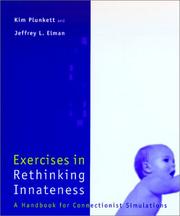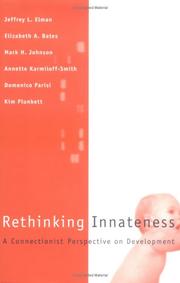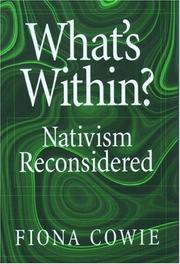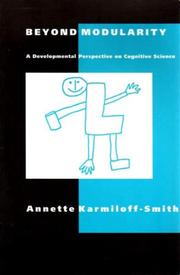| Listing 1 - 7 of 7 |
Sort by
|
Book
ISBN: 1607419025 9781607419020 9781604568059 1604568054 Year: 2009 Publisher: New York Nova Science Publishers
Abstract | Keywords | Export | Availability | Bookmark
 Loading...
Loading...Choose an application
- Reference Manager
- EndNote
- RefWorks (Direct export to RefWorks)
Self. --- Connectionism. --- Nativism (Psychology) --- Community psychology. --- Psychology, Applied --- Social psychology --- Innateness (Psychology) --- Innatism (Psychology) --- Nature and nurture --- Psychology --- Connexionism --- Cognition --- Personal identity --- Consciousness --- Individuality --- Mind and body --- Personality --- Thought and thinking --- Will

ISBN: 0262062127 0262561468 0262272903 1423726596 0262250489 9780262272902 9780262062121 9780262561464 Year: 2001 Publisher: Cambridge, Mass. : MIT Press,
Abstract | Keywords | Export | Availability | Bookmark
 Loading...
Loading...Choose an application
- Reference Manager
- EndNote
- RefWorks (Direct export to RefWorks)
Annotation
Cognitive science --- Nativism (Psychology) --- Philosophy of mind --- Mind, Philosophy of --- Mind, Theory of --- Theory of mind --- Philosophy --- Metaphysics --- Philosophical anthropology --- Innateness (Psychology) --- Innatism (Psychology) --- Nature and nurture --- Psychology --- Science --- Cognitive science. --- Philosophy of mind. --- Nativism (Psychology). --- Cognitive psychology --- Theory of knowledge --- Computational intelligence. --- Cognitive psychology. --- COGNITIVE SCIENCES/General --- PHILOSOPHY/Philosophy of Mind/General --- Psychology, Cognitive --- Intelligence, Computational --- Artificial intelligence --- Soft computing

ISBN: 0262661055 0262287080 0585382069 9780262287081 Year: 1997 Publisher: Cambridge, Mass. MIT
Abstract | Keywords | Export | Availability | Bookmark
 Loading...
Loading...Choose an application
- Reference Manager
- EndNote
- RefWorks (Direct export to RefWorks)
Cognitive psychology --- Artificial intelligence. Robotics. Simulation. Graphics --- Theory of knowledge --- Nature and nurture. --- Connectionism. --- Nativism (Psychology) --- Nativism (Psychology). --- Connexionism --- Cognition --- Environment --- Genetics and environment --- Heredity and environment --- Nature --- Nature versus nurture --- Nurture and nature --- Genetics --- Heredity --- Human beings --- Innateness (Psychology) --- Innatism (Psychology) --- Nature and nurture --- Psychology --- Nurture --- Effect of environment on --- Environment and genetics --- Environment and heredity --- COGNITIVE SCIENCES/General --- COGNITIVE SCIENCES/Psychology/Cognitive Psychology

ISBN: 0262050528 026255030X 0262272296 0585020345 9780585020341 9780262050524 9780262272292 9780262550307 Year: 1996 Publisher: Cambridge, Mass. : MIT Press,
Abstract | Keywords | Export | Availability | Bookmark
 Loading...
Loading...Choose an application
- Reference Manager
- EndNote
- RefWorks (Direct export to RefWorks)
Rethinking Innateness asks the question, "What does it really mean to say that a behavior is innate?" The authors describe a new framework in which interactions, occurring at all levels, give rise to emergent forms and behaviors. These outcomes often may be highly constrained and universal, yet they are not themselves directly contained in the genes in any domain-specific way. One of the key contributions of Rethinking Innateness is a taxonomy of ways in which a behavior can be innate. These include constraints at the level of representation, architecture, and timing; typically, behaviors arise through the interaction of constraints at several of these levels. The ideas are explored through dynamic models inspired by a new kind of "developmental connectionism," a marriage of connectionist models and developmental neurobiology, forming a new theoretical framework for the study of behavioral development. While relying heavily on the conceptual and computational tools provided by connectionism, Rethinking Innateness also identifies ways in which these tools need to be enriched by closer attention to biology.
Cognitive psychology --- Connectionism --- Nativism (Psychology) --- Nature and nurture --- Connexionnisme --- Nativisme (Psychologie) --- Hérédité et milieu --- Nature and nurture. --- Connectionism. --- Nativism (Psychology). --- Hérédité et milieu --- Theory of knowledge --- #KVHA:Psycholinguistiek --- Environment --- Genetics and environment --- Heredity and environment --- Nature --- Nature versus nurture --- Nurture and nature --- Genetics --- Heredity --- Human beings --- Innateness (Psychology) --- Innatism (Psychology) --- Psychology --- Connexionism --- Cognition --- Nurture --- Effect of environment on --- Environment and genetics --- Environment and heredity --- COGNITIVE SCIENCES/General --- COGNITIVE SCIENCES/Psychology/Cognitive Psychology
Book
ISBN: 9781433804670 1433804670 1433813939 Year: 2009 Publisher: American Psychological Association
Abstract | Keywords | Export | Availability | Bookmark
 Loading...
Loading...Choose an application
- Reference Manager
- EndNote
- RefWorks (Direct export to RefWorks)
Originally proposed in 1975, the transactional model has become central to understanding the interplay of nature and nurture in explaining the development of positive and negative outcomes for children. Although scientists have long acknowledged that nature and nurture work together in producing positive or negative developmental outcomes, such cooperation has been difficult to demonstrate because of inadequate conceptual models, experimental designs or statistical methodologies. This book documents the state-of-the-art research in developmental psychology for overcoming these inadequacies, and present new ideas for future work.The book is divided into five parts. Part One introduces the transactional model and designs for transactional research. Parts Two and Three focus on the predictive power of the transactional model and the many social settings that contribute to child progress. Part Two specifically examines the relations between infants and children and their parents, focusing on the relationship between child characteristics and behaviors and parents' child-rearing beliefs and behavior. Part Three broadens the perspective on child development to include the effects of the interplay among children and parents, neighborhood, school, ethnic, and socioeconomic environments. Parts Four and Five discuss new directions in transactional psychology and examine the idea of the transaction itself.
Genetic psychology --- Developmental psychology --- Nativism (Psychology) --- Nature and nurture --- Psychologie génétique --- Psychologie du développement --- Nativisme (Psychologie) --- Hérédité et milieu --- Child Development --- Environment --- Behavioral Genetics --- Parent-Child Relations --- Personality Development --- Child Psychology --- Ontwikkeling van het kind --- Ontwikkelingspsychologie --- Psychologie génétique --- Psychologie du développement --- Hérédité et milieu --- Genetics and environment --- Heredity and environment --- Nature --- Nature versus nurture --- Nurture and nature --- Genetics --- Heredity --- Human beings --- Innateness (Psychology) --- Innatism (Psychology) --- Psychology --- Human genetics --- Development (Psychology) --- Developmental psychobiology --- Life cycle, Human --- Nurture --- Effect of environment on --- Genetic psychology. --- Developmental psychology. --- Nature and nurture. --- Environment and genetics --- Environment and heredity

ISBN: 0195123840 0195159780 0199849528 9780195159783 Year: 1999 Volume: *2 Publisher: New York, N.Y. Oxford University Press
Abstract | Keywords | Export | Availability | Bookmark
 Loading...
Loading...Choose an application
- Reference Manager
- EndNote
- RefWorks (Direct export to RefWorks)
Aangeboren begrippen (Filosofie) --- Aangeboren ideeën (Filosofie) --- Acquisition du langage --- Acquisition of language --- Ideae innatae --- Idées innées (Philosophie) --- Innate ideas (Philosophy) --- Innateness (Philosophy) --- Innatism (Philosophy) --- Innatisme --- Inneïsme --- Innéisme --- Langage [Acquisition du ] --- Language acquisition --- Language development in children --- Nativism (Psychology) --- Nativisme (Psychologie) --- Taalverwerving --- Philosophical anthropology --- Theory of knowledge --- Psycholinguistics --- Innateness (Psychology) --- Innatism (Psychology) --- Developmental linguistics --- Developmental psycholinguistics --- Language and languages --- Psycholinguistics, Developmental --- Acquisition --- Chomsky, Noam --- Nature and nurture --- Psychology --- Interpersonal communication in children --- Idea (Philosophy) --- Philosophy --- Chomsky, Noam. --- Language acquisition. --- Chomsky, Noam, --- Chomsky, Abraham Noam --- Chomsky, Noam, - 1928 --- -Innate ideas (Philosophy) --- -Philosophical anthropology

ISBN: 0262111691 0262611147 0262276747 0585020442 9780585020440 9780262276740 9780262111690 9780262611145 Year: 1992 Publisher: Cambridge, Mass. MIT
Abstract | Keywords | Export | Availability | Bookmark
 Loading...
Loading...Choose an application
- Reference Manager
- EndNote
- RefWorks (Direct export to RefWorks)
Taking a stand midway between Piaget's constructivism and Fodor's nativism, Annette Karmiloff-Smith offers an exciting new theory of developmental change that embraces both approaches. She shows how each can enrich the other and how both are necessary to a fundamental theory of human cognition.Karmiloff-Smith shifts the focus from what cognitive science can offer the study of development to what a developmental perspective can offer cognitive science. In Beyond Modularity she treats cognitive development as a serious theoretical tool, presenting a coherent portrait of the flexibility and creativity of the human mind as it develops from infancy to middle childhood.Language, physics, mathematics, commonsense psychology, drawing, and writing are explored in terms of the relationship between the innate capacities of the human mind and subsequent representational change which allows for such flexibility and creativity. Karmiloff-Smith also takes up the issue of the extent to which development involves domain-specific versus domain-general processes. She concludes with discussions of nativism and domain specificity in relation to Piagetian theory and connectionism, and shows how a developmental perspective can pinpoint what is missing from connectionist models of the mind.
Constructivism (Psychology) --- Modularity (Psychology) in children --- Cognition chez l'enfant --- Constructivisme (Psychologie) --- Modularité chez l'enfant --- Nativisme (Psychologie) --- Modularity (Psychology) in children. --- Constructivism (Psychology). --- Modularité chez l'enfant --- Cognition in children --- Nativism (Psychology) --- Human Development --- Age Groups --- Mental Processes --- Growth and Development --- Behavior and Behavior Mechanisms --- Persons --- Psychological Phenomena and Processes --- Physiological Processes --- Named Groups --- Psychiatry and Psychology --- Physiological Phenomena --- Phenomena and Processes --- Child --- Cognition --- Infant --- Child Development --- Social Sciences --- Psychology --- Infant Development --- Development, Child --- Development, Infant --- Psychology, Child --- Growth --- Infants --- Cognitive Function --- Cognitions --- Cognitive Functions --- Function, Cognitive --- Functions, Cognitive --- Children --- Minors --- Physiological Concepts --- Physiological Phenomenon --- Physiological Process --- Concept, Physiological --- Concepts, Physiological --- Phenomena, Physiological --- Phenomenas, Physiological --- Phenomenon, Physiological --- Physiological Concept --- Process, Physiological --- Processes, Physiological --- Psychologic Processes --- Psychologic Processes and Principles --- Psychological Processes --- Phenomena, Psychological --- Processes, Psychologic --- Processes, Psychological --- Psychological Phenomenas --- Psychological Processe --- Person --- Development and Growth --- Developmental Biology --- Human Information Processing --- Information Processing, Human --- Age Group --- Group, Age --- Groups, Age --- Development, Human --- Psychology, Developmental --- Innateness (Psychology) --- Innatism (Psychology) --- Nature and nurture --- Child psychology --- Cognition (Child psychology) --- Thought and thinking in children --- Cognitive psychology --- Cognition in children. --- Nativism (Psychology). --- Humans --- Age Groups. --- Behavior and Behavior Mechanisms. --- Child Development. --- Child. --- Cognition. --- Growth and Development. --- Human Development. --- Infant. --- Mental Processes. --- Named Groups. --- Persons. --- Phenomena and Processes. --- Physiological Phenomena. --- Physiological Processes. --- Psychiatry and Psychology. --- Psychological Phenomena and Processes. --- Psychology. --- Social Sciences. --- COGNITIVE SCIENCES/General --- COGNITIVE SCIENCES/Psychology/Cognitive Psychology
| Listing 1 - 7 of 7 |
Sort by
|

 Search
Search Feedback
Feedback About UniCat
About UniCat  Help
Help News
News